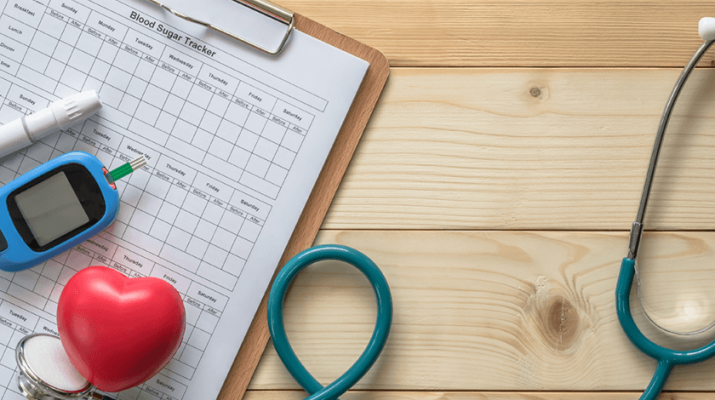Once someone has been diagnosed with Type 2 diabetes, can lifestyle changes in diet and exercise reverse it — even cure it?
By Deborah Jeanne Sergeant
Type 2 diabetes affects nearly one in 10 Americans, according to the Centers for Disease Control and Prevention (CDC). Although most people who have Type 2 diabetes are over age 45, the CDC further states that diabetes is on the rise among younger people.
Physician Ruth Weinstock, distinguished service professor of medicine and medical director of Upstate Medical University’s Joslin Diabetes Center, explained how diabetes works.
“Type 2 diabetes represents a heterogeneous groups of diseases, all of which are characterized by elevated blood sugar — glucose — levels,” she said. “The pancreas does not make enough insulin, the hormone needed to keep blood glucose readings normal, and the body is resistant to the action of insulin.”
Because of this damage to the pancreas, people with Type 2 diabetes require more insulin to maintain normal, healthy blood sugar levels and other hormone levels.
Once someone has been diagnosed with Type 2 diabetes, can lifestyle changes in diet and exercise reverse it, even cure it?
The experts say no, but lifestyle changes can prevent Type 2 diabetes and, for those diagnosed with Type 2 diabetes, it can reduce dependence upon medication and the risk of complications that can accompany Type 2 diabetes, including heart disease, vision loss, and kidney disease.
“The majority of people with Type 2 diabetes are overweight or obese, and physical inactivity is common,” Weinstock said. “Weight loss and increased physical activity are helpful, reducing insulin resistance. For some patients who have not had diabetes for a very long period of time, lifestyle change with weight loss can normalize blood glucose levels.”
The damage to the pancreas varies among diabetics. Weinstock said that the more severely the person is insulin deficient, the less likely diet and exercise alone can normalize blood glucose levels.
“The duration of the diabetes, the need for insulin therapy, genetics, as well as other factors determine whether Type 2 diabetes in a particular person can be ‘reversed’ with diet and lifestyle change,” Weinstock said. “But adapting a healthy lifestyle is of benefit for all people with diabetes. “
Since the damage to the pancreas can’t be undone, medical providers don’t use the word “cure.” However, lifestyle changes can reduce need for medication and help lower risk or delay onset of diabetes complications. Reverting to their previous diet and sedentary lifestyle will undo any progress they’ve made.
“A healthy lifestyle is very important,” Weinstock said. “Meal planning should be individualized, taking into account the food preferences of the family, dietary needs dictated by other co-existing medical conditions, and any financial or other constraints. Sustainability is of the utmost importance. I do not recommend crash diets.”
She said that reducing sodium and alcohol intake is important, as well as carbohydrates.
“They are the major dietary source of glucose, and should not be consumed in excess,” Weinstock said. “In general, complex carbohydrates are preferred over simple carbohydrates.”
Complex carbohydrates are found in foods like oatmeal, popcorn, brown rice and whole grain pasta and whole grain bread. Simple carbohydrates examples include white bread, white rice, white potatoes, standard pasta, and desserts like cake, cookies and pastries.
Instead of the latter, Laurel Sterling, registered dietitian, nutritionist and educator with Carlson Laboratories in Canastota, advises that people with Type 2 diabetes should eat “ample protein and fiber-rich veggies with each meal and lower amounts of overall carbohydrates, especially simple carbohydrates with higher sugar content,” she said.
Skipping meals is also a no-no. Instead, Sterling said they should eat three meals a day and, if needed to keep blood sugar stable, have small, protein- and fiber-rich snacks between meals.
“Adding in a daily exercise routine will assist better levels of blood sugar by using up extra glucose that is in the bloodstream, and losing at least 10% body weight significantly aids levels as well. Certain supplements can support blood sugar levels as well.”
Exercise and bariatric vitamins can also aid in weight loss.
Weinstock encourages diabetics who are overweight to “achieve and maintain a normal body weight when possible. Physical activity is also important. In general, for adults, 150 minutes or more of aerobic activity each week is recommended.”
For people who have not recently exercised, gradual introduction under the guidance of their healthcare provider is important to avoid injury.
“Exercise should be customized to the individual,” Weinstock said. “Everyone should be counseled to stop smoking.”
Diabetics should discuss reducing medication with their healthcare providers before making any changes.

